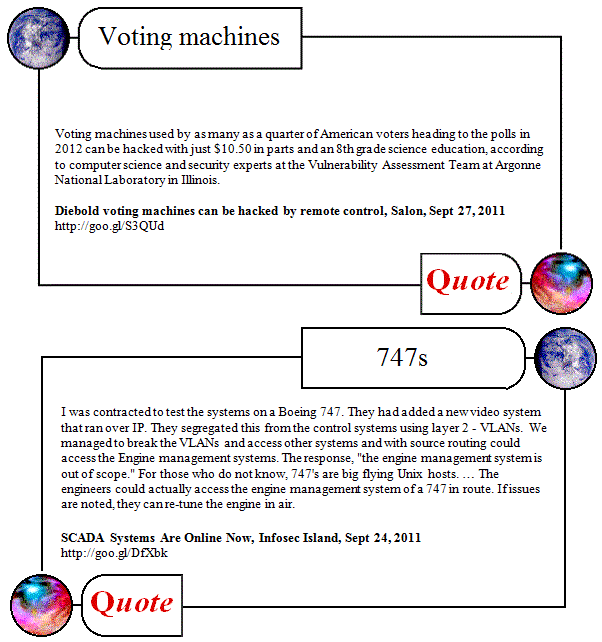More on R2P, Second Thoughts by Slaughter? Plus, Drezner on Networks
Friday, September 30th, 2011R2P is in the news while I slowly and laboriously wind my way through writing the next edition of the R2P is the New COIN series.
The Palestinian bid for statehood and traffic congestion weren’t the only things going on in New York last week as the 66th U.N. General Assembly convened. One of the issues privately discussed by foreign ministers at the United Nations was the “responsibility to protect,” or R2P. This concept was central to the U.N. mandate to protect civilians in Libya, which led to NATO‘s aerial involvement there. As the dust settles in Tripoli, it has become necessary to refute a powerful myth that has developed among some pundits and politicians. That myth is that R2P bestows “the right to intervene” in Libya.Even though R2P features in just two paragraphs of the 40-page “outcome document” of the 2005 U.N. World Summit, historian Martin Gilbert has suggested that it constituted “the most significant adjustment to national sovereignty in 360 years.”R2P’s core idea is that all governments have an obligation to protect their citizens from genocide, war crimes, ethnic cleansing and crimes against humanity. It is primarily a preventive doctrine. However, R2P also acknowledges that we live in an imperfect world and if a state is “manifestly failing” to meet its responsibilities, the international community is obligated to act. It is not a right to intervene but a responsibility to protect.
The distinction is not diplomatic artifice. After the 1994 Rwandan genocide and the 1995 massacre in the Bosnian town of Srebrenica, the international community resolved to never again be a passive spectator to mass murder. Still, it would not have been surprising if R2P had quietly expired after 2005. The United Nations, after all, can be a place where “good ideas go to die.” Instead, within the U.N. the debate now is about how R2P should be meaningfully implemented, rather than whether such a responsibility exists….
If I were the House Chairman of the Foreign Affairs Committee or the Senate Armed Services Committee, I sure would like to know what those foreign ministers and especially our SECSTATE or UN Ambassador were saying about R2P! I might even suggest that, in televised hearings, that before the US endorse or adhere to any newly fashionable concepts of sovereignty, the elected representatives of the people of the United States should be informed and consulted.
Simon Adams, like most commenters in the R2P debate, is focused on the impact an R2P doctrine as part of international law would have on military intervention, especially the frequency of American military intervention. This is reasonable because, logically, R2P implies much larger burdens and more frequent interventions overseas. But the flip side, if you look at the implication of “new sovereignty” as articulated by Dr. Slaughter, are changes to how we as Americans govern ourselves, transfers of power and authority to unelected officials, private interests and even foreigners, as well as limitations on democratic consent.
[Limitations on the democratic consent of the unwashed masses seems to be popular lately with the political elite]
Speaking of Anne Marie Slaughter, she recently penned a curious op-ed about Afghanistan that is not a retreat from R2P, but comes across as at least a step back from seeking maximalist policy objectives with military force, in the face of messy realities:
Where the Afghanistan effort broke down
….For a long time I was convinced that the NATO intervention in Afghanistan could be successful at building a functioning Afghan government that would provide basic services to its citizens. My views were largely shaped by my regular conversations with my long-time friend Sarah Chayes, who lived in Kandahar for much of past decade running first a dairy cooperative and then a soap and fragrance business with Afghans. We were failing, in her view, because of the high NATO tolerance for the cancerous corruption that was sucking the life out of the country, starting at the top. Her book Punishment of Virtue tells the tale, describing how Afghans genuinely committed to rebuilding their country have been systematically driven out or killed by their compatriots who are profiting from the enormous in-flux of money and opportunity that inevitably accompanies large-scale Western intervention in a poor country. She thought, and I agreed, that the U.S. had had an opportunity to help rebuild a very different Afghanistan immediately after the invasion, and that it was still possible to empower the good guys if we were really willing to take on the bad guys profiting at the local, regional, and national level.
Over the past two years, I have reluctantly changed my mind. I have come to believe that where the problem is a predatory state, which the very presence of massive Western resources tends to fuel, it is essentially impossible for outsiders to spur or even effectively support a process of reform from within when we are a big part of the problem by being there in the first place. Stewart makes the argument succinctly and effectively: “the international community necessarily [lacks] the knowledge, the power, and the legitimacy to engage with politics at a local provincial level.”
I would add a much more personal dimension, one that is consistent with a 21st century focus on social actors and social relations as well as on governments and inter-governmental relations. The “international community” does not engage with Afghans. Individual men and women (mostly men) do. Those individuals – diplomats, soldiers, development professionals – develop personal relationships with Afghan officials at the national, provincial, and local level. They have to work together on common programs; moreover, the Americans or Europeans are doing their best to cultivate personal relationship in part to garner exactly the knowledge they know they lack. But once those relationships are established, how exactly is a general or a captain, an ambassador or a political counselor, a USAID Mission Director or a field development expert supposed to turn to his or her Afghan counterparts and interlocutors and explain that they should really stop taking bribes and looting the funds intended for their fellow Afghans? And once the denial is issued, as of course it must be, then what? Accuse him or her of lying? The problems that are most central cannot even be talked about honestly. They are always someone else’s fault. But if they cannot be acknowledged, they cannot be resolved.
It is at this micro-level that policies must actually be implemented. And it is at this level that I conclude state-building military interventions are much more likely to fail than to succeed.
Slaughter, in my view, is more insightful with her empirical analysis of the granular mechanics of international relations than the theoretical and especially legal constructs she builds from them. Military force is a blunt instrument; whether you approach it from a Clausewitzian perspective or one partial to Sun Tzu, the ability to extract desired political concessions with violence – to compel the enemy to do your will – becomes more difficult and costly as your ends are at once both expansive and “fine-tuned”. We transformed and fine-tuned the societies of defeated Nazi Germany, Fascist Italy and Imperial Japan, but only after waging the greatest total war since the Mongols sacked Persia. Bismarckian strategic talent to accomplish major ( but not maximalist) strategic goals at reasonably affordable ( but not cheap) costs is an extreme historical rarity.
Finally, Dan Drezner has re-engaged Slaughter on the point of networks in international relations and politics:
Do networks transform the democratic political process?
….As a social scientist, I must acknowledge that this is a powerful prima facie data point in favor of Slaughter.
And yet, it’s worth pushing the NYT thesis a bit. What happens when the coalition of like-minded individuals stop being of like mind? These sorts of protests can be very powerful on single-issue questions where a single policy change is desired. Maintaining this level of activism to affect the ongoing quotidian grubbiness of politics, however, is a far more difficult undertaking. Even if people can be mobilized behind the concept of “Policy X is Stupid!” getting the same consensus on “Policy Y is the Answer!” is harder. Over time, these kind of mass movements have an excellent chance of withering away or fracturing from within. See, for example, the Tahrir Square movement in Egypt.
Another thing, and this is important: unless the people in these movements actually vote in elections, then their agenda will be thwarted in the long run. Even if these kinds of networked movements are new, the political imperative to get elected and re-elected is not. If they don’t vote, then officials have a pretty powerful incentive to curry favor with the people who do vote, don’t take to the streets and
don’t like these young whippersnappers with their interwebshave different policy preferences.
On the transformative nature of networks, I think Slaughter is, in the big picture, correct that scale free networks are different from hierarchies in important behavioral and structural ways. RAND scholar David Ronfeldt, a friend of this blog, has a paper that I would strongly recommend that looks at the sociopolitical nature of tribes, hierarchies, markets and networks that has great relevance to this discussion. Drezner’s counter-point to Slaughter has traction because although networks are powerful, it is a matter of comparative advantage over other social forms in certain environments, but not all environments.
Moreover, a lot of what Slaughter is calling “networks” – especially the “governmental networks” that occur in and within IGOs are really organizations with the characteristic of modularity and are not naturally emergent scale free social networks like your twitter follower list. Secondly, networks have weaknesses as well as strengths and history is replete with networks – like political and social protest movements, peasant rebellions and revolutionary conspiracies – that were unceremoniously and thoroughly crushed by the power of ruling hierarchies. Third, and most important, the de facto existence of tacit, dynamically evolving, social networks as political movers to be taken seriously is not itself a good reason to grant them de jure status in international law as legitimate, authority-wielding, actors.
In fact, I can think of many good reasons not to do so.
[Belated hat tips to Cheryl Rofer, Bruce Kesler, David Ronfeldt]









